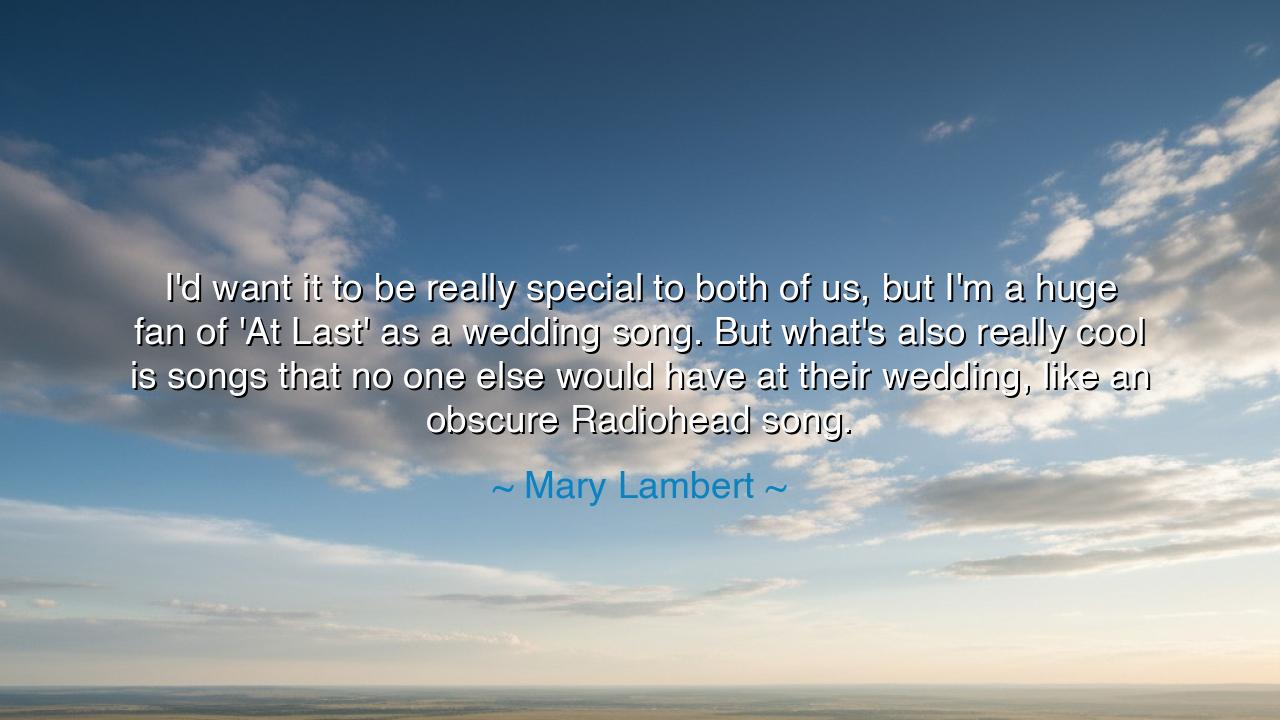
I'd want it to be really special to both of us, but I'm a huge
I'd want it to be really special to both of us, but I'm a huge fan of 'At Last' as a wedding song. But what's also really cool is songs that no one else would have at their wedding, like an obscure Radiohead song.






In the saying of Mary Lambert, we hear the yearning of the heart for a union that is not only sacred but deeply personal: “I’d want it to be really special to both of us, but I’m a huge fan of ‘At Last’ as a wedding song. But what’s also really cool is songs that no one else would have at their wedding, like an obscure Radiohead song.” She speaks of love’s desire not merely to follow the paths well-trodden, but to craft a moment that belongs wholly to two souls joined as one. The wedding song, then, is not just melody—it is the seal of memory, a sound that lingers in the heart long after the feast is done.
The mention of “At Last” calls upon tradition, for that song has been a hymn of countless lovers, echoing across generations. It is the voice of triumph, of love found after long wandering, of hearts finally resting in one another. To choose such a song is to stand in the river of history, allowing the strength of timeless beauty to sanctify the moment. Yet Lambert does not stop here—she longs for a sound that is unique, perhaps an obscure Radiohead song, something hidden from the eyes of the many, yet deeply alive for the two who choose it. This tension between tradition and individuality is the essence of all human celebration: to honor what has been, while creating what has never been before.
So too in history we recall the tale of Marcus Aurelius and Faustina, whose union was honored with ceremonies as grand as Rome itself. Yet the emperor, philosopher though he was, did not treasure the gold or procession above the quiet moments with his wife. His meditations reveal that what sanctifies love is not the empire’s applause, but the secret language spoken between two souls. Lambert’s desire mirrors this truth: though the world may praise “At Last,” the deepest meaning lies in choosing a song that belongs to them alone.
Her words remind us that love is both universal and particular. It is universal in that all lovers recognize themselves in songs of joy and longing sung across centuries. Yet it is particular in that no two hearts beat in precisely the same rhythm, no two journeys weave the same melody. The greatness of a wedding lies not only in the grandeur of its rites but in the little details—like a song—that whisper: this is ours, and no one else’s.
Thus, let all future generations learn: in love, seek both the eternal and the intimate. Let your union be marked by songs the world may know, for they tie you to the chorus of humanity. But also seek the secret tune, the hidden song, the melody that only you and your beloved understand. For it is there, in the space between the celebrated and the obscure, that true love finds its voice, and eternity bends low to listen.






SAShoppe Acc
Mary Lambert’s idea of combining a classic song like 'At Last' with something more unique, like a Radiohead track, highlights the blend of tradition and individuality. It’s a beautiful way to reflect both timeless love and the couple’s personal style. Do you think this mix of well-known and obscure choices can make a wedding feel more intimate, or does it risk alienating guests who might not understand the meaning behind the songs?
NANgoc Anh
I really like how Mary Lambert values making the wedding song special and meaningful to both her and her partner. 'At Last' is a classic choice, but her idea of including something unique, like a Radiohead song, adds a personal touch. I wonder, what other ways can couples personalize their wedding to reflect their unique connection? How much does music play into setting the mood for the entire celebration?
PTChi Phung The
Mary Lambert’s idea of having 'At Last' as a wedding song, alongside an unexpected choice like a Radiohead track, shows how music can deeply represent the couple’s personality and story. I love the idea of incorporating personal favorites into big moments like weddings. Do you think couples should lean into what’s meaningful to them, even if it means breaking away from the norm?
QVtran quang vu
Mary Lambert’s take on wedding songs is so unique and personal. The mix of a timeless song like 'At Last' with something offbeat, like an obscure Radiohead song, really captures the balance of tradition and individuality. It got me thinking, is it important to have a traditional song that everyone knows at weddings, or is it better to pick something more personal and unexpected that reflects the couple’s journey?
MLNgo my linh
I love how Mary Lambert talks about making her wedding song special for both her and her partner. 'At Last' is such a classic choice, but I think it’s interesting that she also loves the idea of having a song no one else would choose, like an obscure Radiohead track. It makes me wonder, do you think the music at a wedding says more about the couple’s relationship than the ceremony itself?